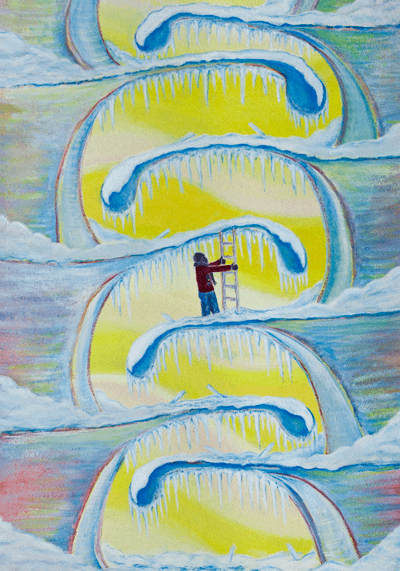Part 1/3
 This topic, Will, Emotion and the Force of Idealism (brought to you in 3 distinct posts), pulls from a variety of sources, but most of all from William James. He was an early American philosopher (1842-1910) and writer who contributed to the field of psychology in its earliest stage.
This topic, Will, Emotion and the Force of Idealism (brought to you in 3 distinct posts), pulls from a variety of sources, but most of all from William James. He was an early American philosopher (1842-1910) and writer who contributed to the field of psychology in its earliest stage.
In this, the first part, we consider the benefits and limitations of the concept of will. We’ll bring together influential ideas that influence both Western (will) and Eastern (acceptance) ways of thinking and functioning. We also begin to look at how these ideas can complement one another toward the betterment of the individual and the society. We also identify that that there is a truth beyond that which we can see, beyond that which we can control, which is relevant to the choices we make.
When working with people who have depression or struggle with high levels of anxiety, we inevitably encounter the questions, “To what degree do we have the power (the willfulness) to change the way we feel?” and “If I cannot will myself to feel better, am I doomed to helplessness and hopelessness?” In the answer lies an important idea worth considering …
Part 1: Understanding the Use of Will
So let’s start out by defining what we mean by will. William James defined will as, “the combination of attention (focusing consciousness) and effort (overcoming inhibitions, laziness, or distractions).” Continuing, he says, “Will is the process which holds one choice among the alternatives long enough to allow the actions to occur.”
 He teaches that it is in the practice of doing difficult things, creating habits of will, that we strengthen the will and gain empowerment in the direction of one’s aims. The act itself is unimportant; being able to do it, in spite of its being unimportant, is the critical element.
He teaches that it is in the practice of doing difficult things, creating habits of will, that we strengthen the will and gain empowerment in the direction of one’s aims. The act itself is unimportant; being able to do it, in spite of its being unimportant, is the critical element.
It reminds me of an interview of Barbara Kingsolver, a favorite author of mine, who has taught herself and her children that, “You can do hard things.”
In the practice of asserting our will, we gain the feeling of control and power. It is how we go about solving problems, mastering skills and attaining influence on the circumstances outside of us.
I might point out that it is weighted more heavily in Western societies and has been behind great discoveries and innovations and has shaped the world we live in today. Everyone knows the Nike motto, “Just Do It”. In psychological language it might be called primary control.
Control vs …
So, what happens when an individual (or society) who has mastered the strength of his/her will reaches the limitation of that ability?
For some it is a moment of crisis, and fueled by frustration and anger, they will push harder towards that which is the intended outcome. To give up is not an option because it represents a lack of will, a concession to failure, a sign of weakness. For many, the opposite of being in control is being out of control…which produces a fear that is unbearable.
For those who are depressed and see only the option of willing themselves out of that emotional condition, the final act is an act of will…to commit suicide, to end their life while maintaining control, their only perceivable option.
Acceptance
While James encourages the continued practice of strengthening the will, he is careful not to believe too much in the power of the will.
He speaks to the point where the will is exhausted and one has no choice but to surrender to that which we aspire after… “complete unification”, as he calls it. He said that the very last step must be left to other forces and performed without the help of one’s own activity.
These are steps beyond the person, as the personality, to find that we are part of a larger system rather than a single time-bound consciousness. It is in the acceptance of one’s limitations, in regards to control, that a person can find the equilibrium that maintains a sense of empowerment.
 It can eliminate frustration, fear, anxiety, and the resulting thoughts and behaviors which often drive the process. It creates an understanding that we are always small players in a bigger context…not to be passive and dis-empowered, nor to extend beyond which is the limitation of our will (individually or collectively). James calls it, “Adjusting ourselves to the unseen order.”
It can eliminate frustration, fear, anxiety, and the resulting thoughts and behaviors which often drive the process. It creates an understanding that we are always small players in a bigger context…not to be passive and dis-empowered, nor to extend beyond which is the limitation of our will (individually or collectively). James calls it, “Adjusting ourselves to the unseen order.”
So, going back to the person who is trying to find their way out of depression or anxiety (or societies who are trying to find their way out of social problems), let’s expand on the notion of acceptance, or in psychological language, secondary control.
First it must be understood that it [acceptance] is not synonymous with approval or passivity…
Acceptance is making peace with the truth of what is… not as it relates to some hypothetical idea of what we want it to be.
Acceptance is more prevalent in the Eastern traditions of thought. It is a major teaching in Buddhism and Taoism.
When a person is depressed or anxious, they are experiencing emotions that feel stronger than their ability to overcome them. It is helpful to will one-self to do activities that will increase the likeliness of feeling better; we know that exercise and activation of the senses can shift one’s mood and bring one to a brighter perception of life. However, if a person believes that it is up to them to overcome the condition of depression or anxiety, they will likely see their inability to change their feelings as a failure… increasing the internal burden on themselves.
We have learned that the way out of these mood disorders is by finding the ability to do what we can control (will) and… to accept what we cannot control (will). It seems like one of the lessons of psychology is to do what we can, and then to release our will…trusting in something, maybe a process, that is bigger than we are…
Stay Tuned…
The next two parts will deal with how we understand emotions, their influence on our thinking and behavior and… what it is to create and use the force of idealism. These, too, are looked at on levels of the micro and macro perspective.
The final part will be an attempt to look at what is happening in the world and how it is that applying the lessons of will, emotions and idealism can bring about positive change.

